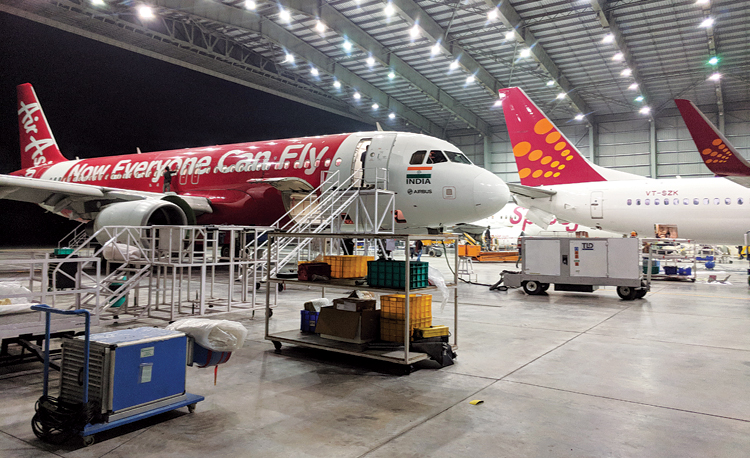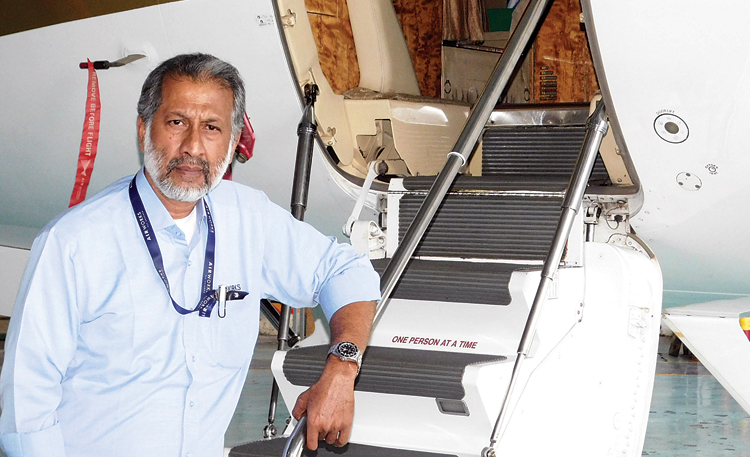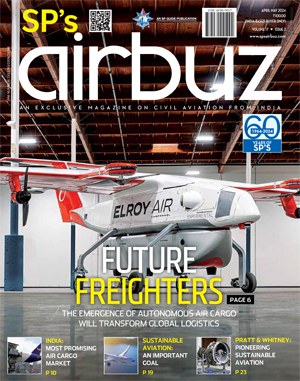EXCLUSIVE
“There have been some serious challenges threatening our very survival and these continue till date. The most important of these is survival at airports.”
RAVI S. MENON, EXECUTIVE DIRECTOR, AIR WORKS INDIA

Air Works India (Engineering) Private Limited with its headquarters at Gurugram, provides engineering, asset management and technology solutions to commercial and business aviation communities in India. It offers services, such as airline maintenance, repair and overhaul (MRO), which includes line maintenance, base maintenance, turnkey maintenance solutions, defence MRO, aircraft cabin interior services and business aviation MRO. Services offered include avionics modifications, upgrades and heavy maintenance for commercial, corporate and executive aircraft. Ravi S. Menon, Executive Director, Air Works India, spoke to Jayant Baranwal, Editor-in-Chief, SP’s AirBuz, about the company.

SP’s AirBuz (SP’s): Can you take us through your journey since inception?
Ravi Menon (RM): It is 67 years since Air Works was established and hence not possible to capture the entire journey. I will stick to a small brief. Air Works was founded in Mumbai on April 16, 1951, by two pioneering aviation enthusiasts B.G. Menon and P.S. Menon. They were passionate about aviation and when the airline (Indian Overseas Airways) they were working for, shut down, they decided to set up the first third party dedicated MRO in the Country to pursue their passion and belief. The timing was very challenging as there was no business for private MROs and the Hindustan Aeronautics Ltd was well established in undertaking major checks on aircraft such as the Dakota DC-3, De-Havilland Heron, Twin-Beech and Skymaster DC-4. It took several years to secure major maintenance contracts and the quality of their delivery won them contracts from Ariana Afghan Airlines, Royal Nepal Airlines and Iran Air. They were persevering and never lost hope and gradually some of the industrialists in the country acquired Dakota DC3s and Twin-Beech aircraft. One of the first industries to acquire an aircraft (Dakota DC-3) was the Birla Group (Late G.D. Birla) which was around 1953/54 and that relationship continues till date. Following that lead, a couple of other industrial houses acquired their own aircraft, which marked a turning point for Air Works. The Hindu newspaper group too acquired four/five Dakotas for ferrying newsprint and these aircraft were based in Chennai which marked the presence of Air Works there. Later the Directorate General of Civil Aviation (DGCA) acquired two Dakotas for calibration of airfields. Thereafter, presence of Air Works was established in Delhi. The Dakotas played a significant role in the development of Business and General Aviation in the country and several State Governments too acquired these aircraft, which were modified from the standard 28-seaters to a business version at Air Works.
Each decade in the service of our industry has been a landmark and with 67 years of service, we have much to celebrate for
Several young aviation enthusiasts got the opportunity to work in the aviation sector and joined Air Works to gain knowledge and experience and later went on to join Air India, Indian Airlines and some of them joined International Airlines operating into India. Air Works had progressively built a name and reputation for quality services and was gradually getting established as an MRO of repute in India. It was in the late 1960s/early 1970s that Air Works secured a Non-Scheduled Operators Permit and acquired a couple of Dakotas to modify and develop for special missions, charters and cargo operations.
We progressively enhanced our capability and competency to undertake modifications on these Dakotas and went on to serve the Indian Space Research Organisation, Indian Institute of Tropical Meteorology, National Remote Sensing Agency among other Government organisations, to undertake aerial survey, aerial photography, testing of satellite payload, artificial rain making, supply dropping and seeding of mountain slopes for forestation.

As the industry grew, turbine-driven aircraft were introduced followed by Jets and Air Works was well positioned to undertake the maintenance of these aircraft. In the early 1970s, Air Works acquired a couple of junked SkyMaster DC-4 aircraft which were rebuilt for cargo operations and we started carrying, fruits, vegetables, meat and livestock to the Middle East and these operations continued until 1980. In 1992, we were awarded the contract to undertake major checks on the Boeing 707 aircraft operated for the Cabinet Secretariat. The checks included Corrosion Prevention and Protection, which led to Air Works signing up with Jet Airways to establish capability for maintaining Boeing 737-300 aircraft. The entire engineering capability was jointly established between Jet Airways and Air Works and worked successfully until the regulations for scheduled domestic carriers required that all maintenance and certification functions were to be undertaken by the airline itself. We transferred our airline division to Jet Airways and continued with our Business & General Aviation MRO services.
In essence, we had to continually re-invent ourselves to ensure survival, which we thoroughly enjoyed and continue to enjoy till date. In 2006, we took in private equity to scale the business and transform Air Works from a family business to a professionally run business, which has proven very successful. In 2008, we established a third party MRO for airliners at Hosur for major checks on Boeing 737 series and Airbus A320 family. Later this capability was enhanced to include ATR 42 and 72 and Q400 aircraft. A dedicated aircraft paint facility, the first of its kind in the country, was then set up at Hosur. We acquired two aircraft painting and refinishing companies, one in the UK (Air Livery) and the other in France (ATE). We also acquired an Aircraft Management Services company (Empire Aviation) in Dubai. The transformation from a family business to a professionally managed company has been achieved and the founding family continues to be actively involved.
We remain passionate about what we do and continue to remain optimistic of the future. Our optimism, passion and belief have served us well all these years
SP’s: As on date, are you a convinced entrepreneur in the sector of MRO?
RM: I joined Air Works on July 10, 1972, and was fortunate to work with my father and uncle who taught me the importance and value of enjoying what one does and taking great pride in it. Having worked with Air Works for 46 years and recognised the value of enjoying what I do, I will continue to enjoy the entrepreneurial spirit within me. I am fortunate to have two cousins of mine working alongside me and we as a family have been blessed to be able to sustain a relationship of work and family for the last 40 years. We believe in what we do, which keeps us going.
SP’s: What all are the challenges you have faced till now and which kind of challenges still persist? What are the remedies for all these challenges according to you?
RM: There have been some serious challenges threatening our very survival and these continue till date. The most important of these is survival at airports. Airport owners/developers do not accord any level of importance to MRO services and seem inclined to terminate MRO leases at the airports. This has been ongoing since 1982 and the situation continues. The other challenges briefly are negative growth in the Business & General Aviation space, import of MRO services by the airlines, non-availability of space to construct hangars at metro airports, tax structures, customs duties and procedures.
MROs in India should be the preferred destination for our airlines for their tip-to-tail solutions. Airports should promote MRO development to help achieve the ‘Make in India’ vision.
The remedy is the intervention by the Ministry of Civil Aviation (MoCA). As an industry, we are happy with the proactive support provided by the Ministry that actively address the much required reform process to facilitate the growth and development of the MRO industry. The industry opportunity is currently worth a billion dollars annually and is set to double over the next decade. Presently, approximately a 100 million is captured within the country. With the reforms being driven by the Ministry, the future is bright for the MRO industry.
SP’s: It is interesting to note that you continue your business despite of stated challenges. What is the secret behind this?
RM: True. We have asked this question of ourselves on occasions when faced with strong turbulence and headwinds, but recognise the addiction that aviation is. We remain passionate about what we do and continue to remain optimistic of the future. Our optimism, passion and belief have served us well all these years.
SP’s: Why is it that aircraft operators, seemingly, scheduled operators and non-scheduled operators, still go outside for their MRO requirements while your company and even some of the other handful companies in India have been there for the job?
RM: For the scheduled airlines, cost is an important factor. Import of MRO services is taxed at five per cent, whereas GST in India is 18 per cent. I do expect the imbalance to even out considering the dollar to rupee valuation, as also the cost of aviation fuel. As regards the Business and General Aviation fleet, a few aircraft do undertake major checks offshore as the capabilities and infrastructure have not been established in the country. The small fleet size of specific aircraft types do not justify the capital investment required to develop full MRO capabilities and these major checks occur at 96 monthly intervals on an average. I do not see any change in this situation in the years to come.
SP’s: What all services do you offer for the different segments of the industry?
RM: Services offered for different segments are as under:
- Business aviation community – Comprehensive CAR 145 services, CAMO and Planning. Painting and interiors.
- General aviation community – Comprehensive CAR 145, CAMO and Planning. Painting and interiors.
- Scheduled operators’ community – Base maintenance checks C and D, painting and interiors for the airliners which include the Airbus A320 family, Boeing 737 series, ATR 42 & 72 and Bombardier Q400.
SP’s: Any thoughts or suggestions for the government bodies in the context of your industry?
RM: Adequate representations highlighting the reforms needed have been made to MoCA through various industry bodies such as the MRO Association, Business Aircraft & Operators Association, Rotary Wing Society of India and the CII. We do hope to see the industry “Wish List” coming to fruition.
SP’s: Do you think we can ever call MRO industry a sun-rise industry?
RM: In a sense, yes. When the much-needed reforms are implemented, the MRO industry will witness an unprecedented growth providing gainful employment opportunities to between fifty thousand to a hundred thousand skilled people and the airlines will be encouraged to address their engineering needs in the country.
SP’s: What all is needed to make it a sun-rise industry?
RM: We possess all the right inputs in terms of geographic location, technically literate youth and last but not the least, our labour costs are low. All we need are reforms to do away with the impediments to establish India as a robust and sustainable MRO Hub in the region.
SP’s: Finally, what have been the Best and Worst moments in Air Works?
RM: As for the Best moment, each decade in the service of our industry has been a landmark and with 67 years of service, we have much to celebrate for. As for the worst moment, I cannot recollect any worst moment. Having said that, it always is disturbing when airports fail to recognise the importance and value of MRO services in creating self-sufficiency in aircraft maintenance in the country. MROs in India should be the preferred destination for our airlines for their tip-to-tail solutions. Airports should promote MRO development to help achieve the ‘Make in India’ vision.





